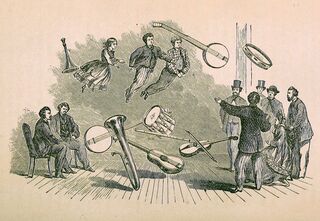Anxiety
Should You Worry About How Delusional You Are?
If repetition is the architecture of belief, how easy is it to delude ourselves?
Posted November 27, 2020

What is the difference between an illusion and a delusion? Hint: There is a good chance it isn't what you think it is.
According to the Oxford English Dictionary, an illusion is "a thing that is or is likely to be wrongly perceived or interpreted by the senses." A delusion, on the other hand, is "an idiosyncratic belief or impression that is firmly maintained despite being contradicted by what is generally accepted as reality or rational argument, typically a symptom of mental disorder."
Other dictionaries may give shorter definitions, yet the bottom line seems clear. Philosophers have long debated "What is reality?" Evidently, dictionaries aren't bothered by uncertainty. Apparently, we can take it for granted the human brain is entirely capable of distinguishing between what is real and what is an illusion.
But is this true? Or is something being overlooked that shouldn't be? Here are five reasons all of us are more delusional much of the time than we realize.
The eye of the beholder
- It is easy to forget why we have to stay in touch with the world around us. It's not so we can enjoy the beauty of a glorious sunset, or hum along with Gustav Mahler or Ariana Grande. You do not have to be an evolutionist to see that without our body's senses we would quickly be among the dead or dying.
- It takes a lot of energy to power the human brain. Weighing in only around 2% of body mass, it consumes roughly 25% of the resources needed to run a human being. It is hardly surprising, therefore, that our bodies try to use as little time and energy as possible when dealing with the challenges the world throws at us.
- Consequently, we are not cameras or digital recorders (nor are we supercomputers). As the psychologist David Eagleman has remarked, our brains retain "only the minimum amount of information from our senses that we need to navigate the world." Contrary to popular wisdom, our memories do not start off being richly detailed, only to decline with time. Why we so often have trouble remembering what something is like, or what actually happened, is not merely because we have forgotten what we once knew. Rather, we have "faulty memories" because we don't even try to memorize all that much about what we are experiencing or about what things are "really like out there."
- Anyone who has had to memorize music or their lines in a play knows well that it not only takes effort to do so, but you have to go over the same ground time and again. This is why I often say "repetition is the architecture of belief." For understandable reasons, the human brain is inclined to be stubborn and pigheaded. And it is repetition more often than concerted hard work that normally gets things through our thick skulls.
- Consequently, the brain mostly runs on what it has already experienced and learned to expect from the world around it. Despite what some philosophers have said, reality is not an illusion. The world is not literally trying to fool us. However, we need to accept that once the repetition of things and events in the real world has built up within our minds a sense of what to expect as a matter of course, we are predisposed — I would even claim strongly predisposed — to take it easy and simply assume things and events in the here and now will be, and even should be, more or less the way they have always been ... as far as we know, and as far as we can tell.
Repetition makes the heart grow fonder
"Repetition," according to the psychologist Tom Stafford, "makes a fact seem more true, regardless of whether it is or not. Understanding this effect can help you avoid falling for propaganda."
Stafford himself has written that he is not convinced this is the sizable problem it sounds like it is. Experimental evidence suggests that with or without repetition, people are more likely to believe actual facts rather than suggestive lies.
Maybe so, but here's the catch. What on earth is an actual fact?
Stafford apparently knows. "If repetition was the only thing that influenced what we believed we'd be in trouble, but it isn't. We can all bring to bear more extensive powers of reasoning, but we need to recognize they are a limited resource."
Is this optimistic admonishment more than just wishful thinking? He evidently thinks so. "We live in a world where the facts matter, and should matter. If you repeat things without bothering to check if they are true, you are helping to make a world where lies and truth are easier to confuse."
Stafford wrote these words in late October 2016 just before the election of Donald Trump as President of the United States on November 8th. I wonder if he would still be saying the same thing now given all that has happened in the past four years.
Setting politics aside, however, here is the point I want to make. As I discussed in a previous post, we have to struggle to stay in touch with reality. The world is not an illusion. But it is a delusion, a trick of the human mind. We think we know much more about the world than we actually do. For the most part, what we think we know is good enough to get us from the here and now to the there and then. But repetition doesn't just turn lies into truths. Repetition can also give us a false sense of who we are, where we are, and what is right and wrong.
Next up — Fantasy and Imagination: Beyond the Reach of Neuroscience?
References
Deborah Blum (2006). Ghost Hunters. William James and the Search for Scientific Proof of Life after Death. New York: Penguin Books.
David Eaglemen (2015). The Brain. The Story of You. New York: Pantheon Books.


